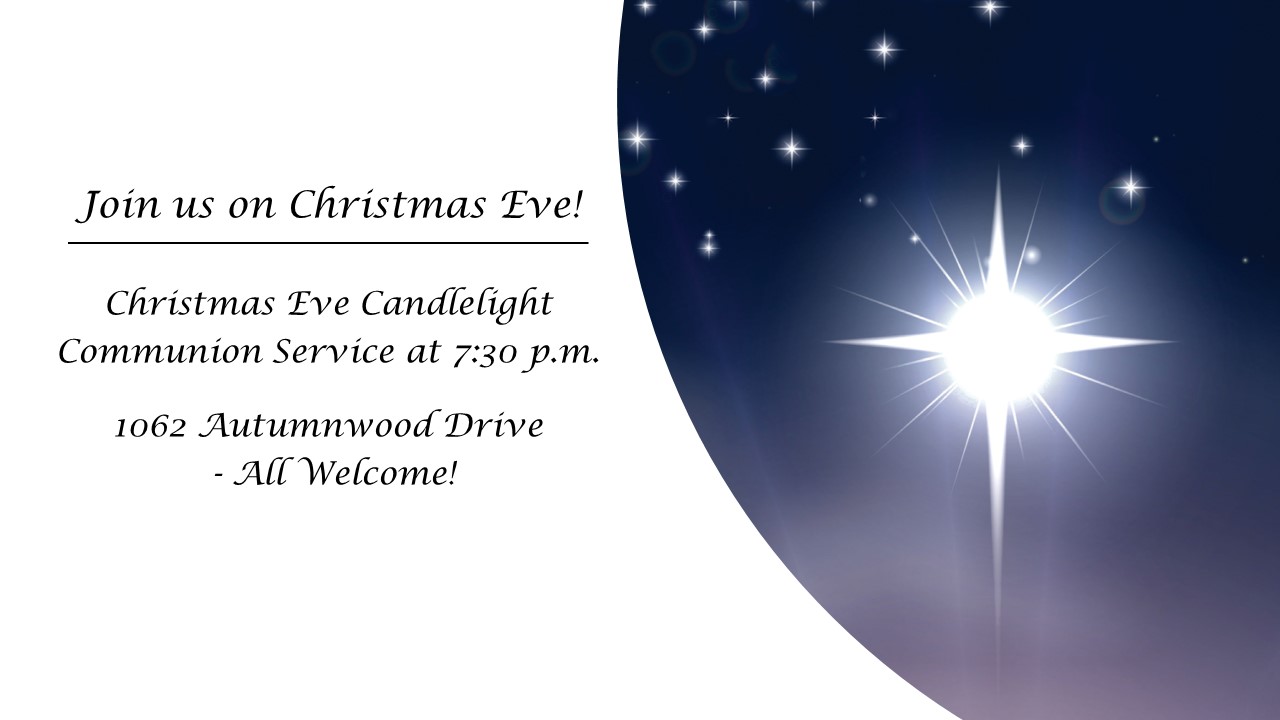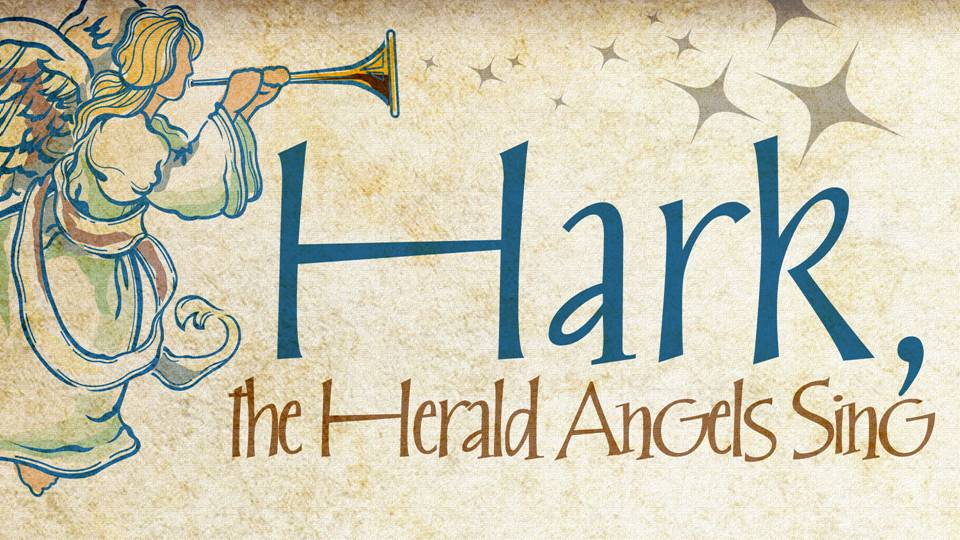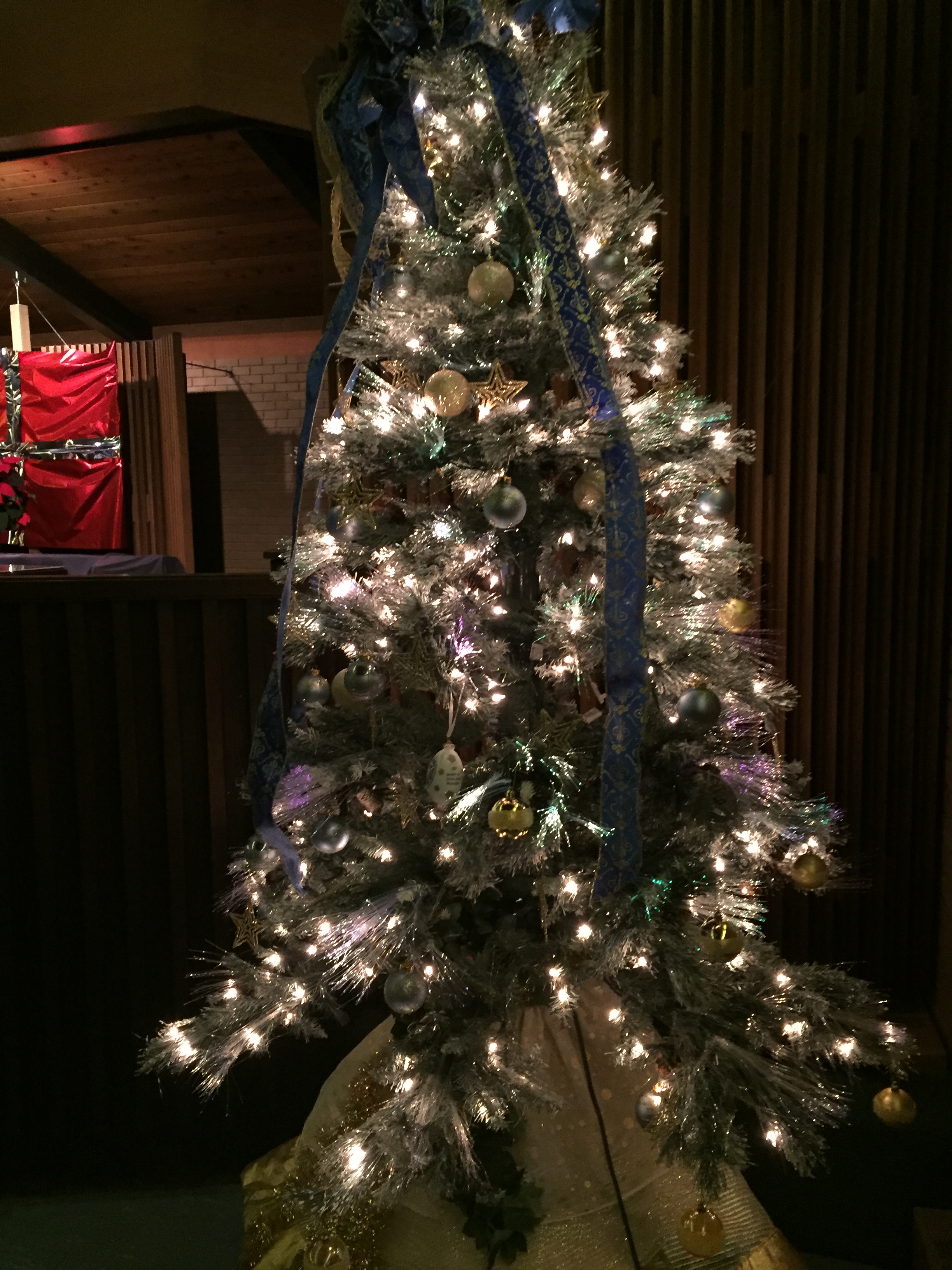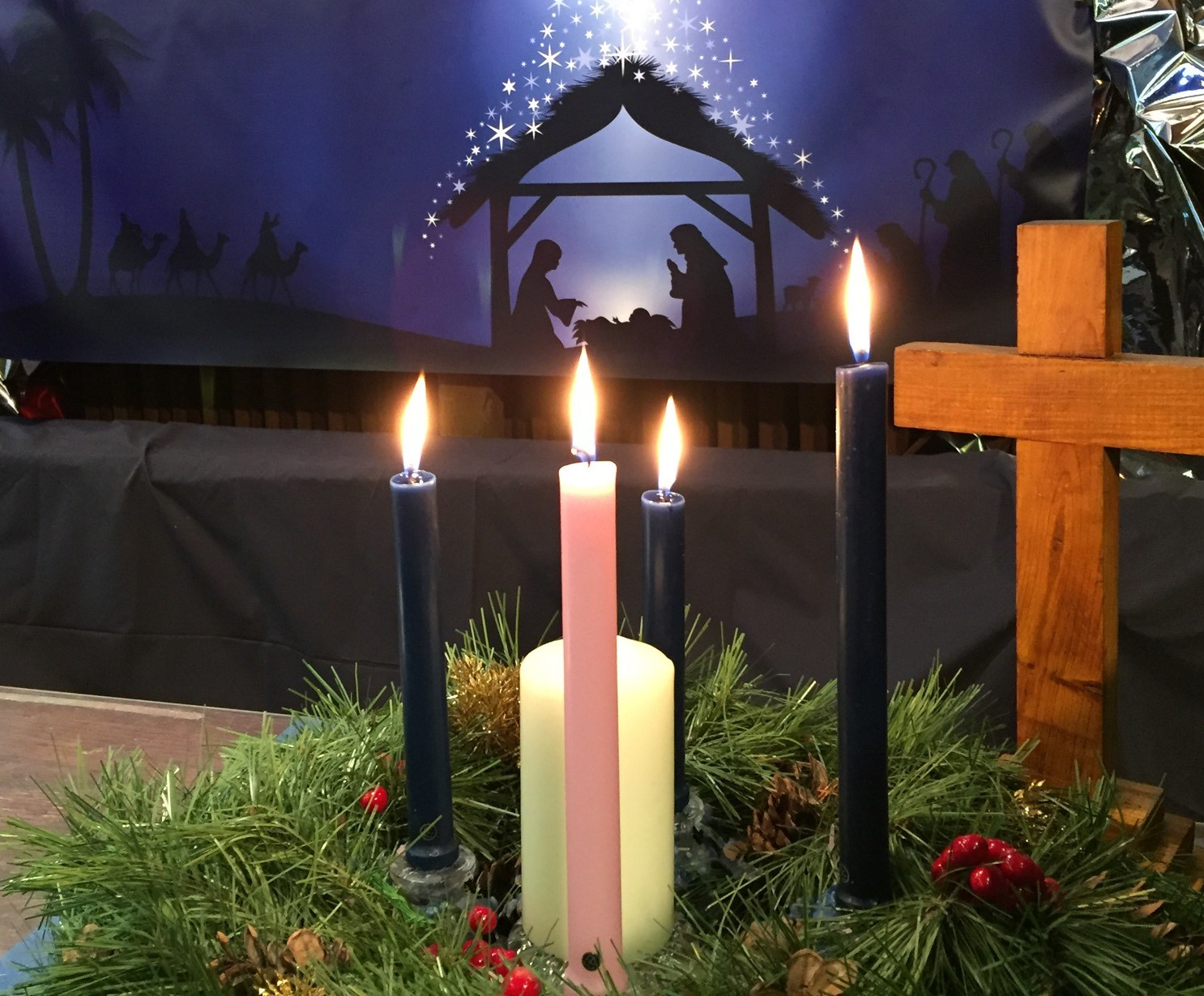Notes on the Notes – December 24, 2018

Christmas Eve
Tonight’s Scripture Readings:
John 1:1-5 Isaiah 9:2-7 Luke 2:1-20
Tonight’s Music:
“A Candle is Burning” (VU #6)
“A candle is burning, a flame warm and bright,
A candle of hope in December’s dark night.
While angels sing blessing from heaven’s starry sky,
Our hearts we prepare now for Jesus is nigh.
A candle is burning, a candle of peace,
A candle to signal that conflict must cease:
For Jesus is coming to show us the way;
A message of peace humbly laid in the hay.
A candle is burning, a candle of joy,
A candle to welcome brave Mary’s new boy.
Our hearts fill with wonder, and eyes light and glow
As joy brightens winter like sunshine on snow.
A candle is burning, a candle of love,
A candle to point us to heaven above.
A baby for Christmas, a wonderful birth,
For Jesus is bringing God’s love to our earth.
We honour Messiah with Christ-candle’s flame,
Our Christmas Eve candles glad tidings proclaim.
O come, all you faithful, rejoice in this night,
As God comes among us, the Christian’s true light.”
As we light our Advent wreath we will sing the words written by Sandra Dean (1986) with music written for the carol “Away in a Manger” by James R. Murray (1887).
Hear an instrumental version of the tune at: https://youtu.be/gVWdAaNXg6c
“Angels We Have Heard on High” (VU #38)
“Angels we have heard on high sweetly singing o’er the plains, and the mountains in reply, echoing their joyous strains.
Gloria, in excelsis Deo!
Shepherds why this jubilee? Why your joyous strains prolong?
What the gladsome tidings be which inspire your heavenly song?
Gloria, in excelsis deo!
Come to Bethlehem and see Christ whose birth the angels sing,
Come, adore on bended knee Christ the Lord, the newborn King.
Gloria in excelsis Deo!
See him in a manger laid, whom the choirs of angels praise;
Mary, joseph, lend your aid, while our hearts in love we raise.
Gloria in excelsis Deo!”
Many years ago shepherds in the hills of southern France had a Christmas Eve custom of calling to one another, singing “Gloria in Excelsis Deo,” each from his own hillside. The traditional tune that the shepherds used may have been from a late Medieval Latin chorale. It became the magnificent chorus of “Angels We Have Heard on High.”
See the boys choir Liberia perform at: https://www.youtube.com/watch?v=X7MTjm6UYYA
See the acapella group Pentatonix perform the carol at: https://www.youtube.com/watch?v=H0fkkUYIku0
See the boys choir Liberia perform at: https://www.youtube.com/watch?v=X7MTjm6UYYA
See the fascinating Piano Guys at: https://www.youtube.com/watch?v=n543eKIdbUI
“Away in a Manger” (VU #69)
“Away in a manger, no crib for a bed,
The little Lord Jesus lay down his sweet head.
The stars in the bright sky look down where he lay,
The little Lord Jesus, asleep on the hay.
The cattle are lowing, the baby awakes,
But little Lord Jesus, no crying he makes.
I love you, Lord Jesus, look down from the sky
And stay by my side until morning is nigh.
Be near me, Lord Jesus, I ask you to stay
Close by me forever, and love me I pray.
Bless all the dear children in your tender care
And fit us for heaven to live with you there.“
This traditional children’s carol is an anonymous text which seems to have come from the German Lutheran community in Pennsylvania. The tune CRADLE SONG was published in an American collection of Christmas songs entitled Around the World with Christmas (1895).
Hear the song on harp at: https://www.youtube.com/watch?feature=player_embedded&v=rYc-XTYib4o
Hear the song on the piano at: https://www.youtube.com/watch?feature=player_embedded&v=vtW9TLjiPNs
Hear an instrumental of the song at: https://youtu.be/jLdPhWVrXHc
“Hark, the Herald Angels Sing” (VU #48)
“Hark! the herald angels sing Glory to the newborn King;
Peace on earth and mercy mild, God and sinners reconciled:
Joyful all ye nations rise, Join the triumph of the skies,
With the angelic host proclaim, Christ is born in Bethlehem:
Hark! the herald angels sing Glory to the newborn King.
Christ, by highest heaven adored, Christ the everlasting Lord,
Late in time behold him come, offspring of a virgin’s womb.
Veiled in flesh the Godhead see; hail the incarnate deity,
Pleased with us in flesh to dwell, Jesus, our Emmanuel:
Hark! the herald angels sing, Glory to the newborn King!
Hail, the heaven-born Prince of Peace!
Hail, the Sun of Righteousness!
Light and life to all hi brings, risen with healing in his wings.
Mild he lays his glory by, born that we no more may die;
Born to raise us from the earth, born to give us second birth.
Hark! the herald angels sing, Glory to the newborn King!”
The carol we now know as “Hark! the herald angels sing” did not start life as such, and required at least four people to bring it to its current form. Charles Wesley wrote the original words as a Christmas Day hymn and first published it in 1739, with ten four-line verses, rather than the longer eight-line verses with refrain which we have now.
The tune was composed by Felix Mendelssohn for his Festgesang, Op. 68. It was scored for male voices with brass accompaniment, for the Gutenberg Festival in 1840 to celebrate the 400th anniversary of the invention of the printing press. It was adapted into a hymn tune by William Hayman Cummings in 1856.
Hear Frank Sinatra sing at: https://www.youtube.com/watch?v=0GWFdFqLKZ4
“In the Bleak Mid-winter” (VU #55)
“ In the bleak mid-winter, frosty wind made moan,
In the bleak mid-winter, frosty wind made moan,
Earth stood hard as iron, water like a stone;
Snow had fallen, snow on snow, snow on snow,
in the bleak mid-winter, long ago.
Our God, heaven cannot hold him, nor earth sustain;
Heaven and earth shall flee away when he comes to reign;
In the bleak mid-winter a stable place sufficed the Lord God almighty, Jesus Christ.
Enough for him whom cherubim worship night and day,
A breast full of milk, and a manger full of hay.
Enough for him whom angels fall down before,
The ox and ass and camel which adore.
What can I give him, poor as I am?
If I were a shepherd, I would bring a lamb,
If I were a wise man, I would do my part,
Yet what I can I give him – give my heart.”
Christina Rossetti imaginatively placed the holy birth not in warm Bethlehem, but in her chillier and snow-bound native England. It was written before 1872 in response to a request from the magazine Scribner’s Monthly for a Christmas poem. It was published posthumously in Rossetti’s Poetic Works in 1904. The poem became a Christmas carol after it appeared in The English Hymnal in 1906 with a setting by Gustav Holst. Rossetti’s closing verse places the singer at the manger, with the reminder to give the most valuable gift of all – “give my heart.”
Hear the Gloucester Cathedral choir at: http://www.youtube.com/watch?v=xRobryliBLQ
Watch Julie Andrews from her 1987 television special at: https://www.youtube.com/watch?v=H3dcNEec40I
Watch and listen to a beautiful version on trumpet, violin and harp: https://www.youtube.com/watch?v=r8WGlhJKlGo
“Silent Night” (VU #67)
“Silent night! Holy night! All is calm, all is bright round yon virgin mother and child. Holy infant so tender and mild, sleep in heavenly peace, sleep in heavenly peace.
Silent night! Holy night! Shepherds quake at the sight; glories stream from heaven afar; heavenly hosts sing Hallelujah, Christ the Saviour is born, Christ the Saviour is born.
Silent night! Holy night! Song of God, love’s pure light; radiant beams from thy holy face, with the dawn of redeeming grace, Jesus, Lord, at thy birth, Jesus, Lord, at thy birth.”
See Lindsey Stirling perform the song at: https://www.youtube.com/watch?v=QmvwWxzg3lc
See the Three Tenors at: https://www.youtube.com/watch?v=WjhVI4Q0Vfc
To hear the Carpenter’s version of the song, go to: http://www.youtube.com/watch?v=KJhA0CqMl0s
“Joy to the World” (VU #59)
“Joy to the world! the Lord is come; let earth receive her King! Let every heart prepare him room, and heaven and nature sing.
Joy to the earth! the Saviour reigns; let all their songs employ, while fields and floods, rocks, hills and plains repeat the sounding joy.
No more let sings and sorrow grow, nor thorns infest the ground; he come to make his blessings flow far as the curse is found.
He rules the earth with truth and grace, and makes the nations prove the glories of his righteousness and wonders of his love.”
This text is a paraphrase of Psalm 88:4-9. It was written by Isaac Watts and first published in his Psalms of David in 1719.
Enjoy this carol by:
George Fox University Music department: https://youtu.be/6oOwa0CWVVQ
Hillsong at: https://youtu.be/cnsk7iXFCtY
Boys’ choir “Libera” at: http://www.youtube.com/watch?v=5IH8A86FLs0

Merry Christmas from Windsor Park United Church!
Categories: Notes on the Notes


You must be logged in to post a comment.